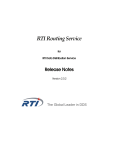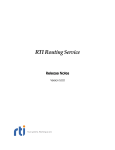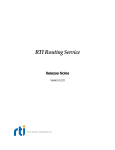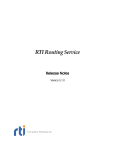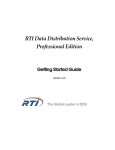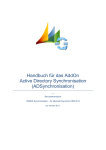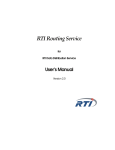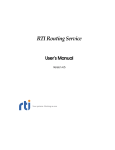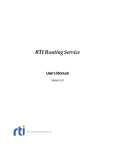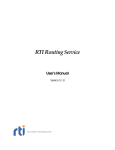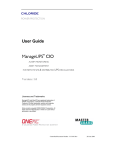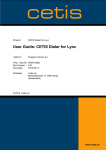Download RTI Routing Service - Community RTI Connext Users
Transcript
RTI Routing Service for RTI Data Distribution Service Release Notes Version 2.0.1 © 2010 Real-Time Innovations, Inc. All rights reserved. Printed in U.S.A. First printing. June 2010. Trademarks Real-Time Innovations and RTI are registered trademarks of Real-Time Innovations, Inc. All other trademarks used in this document are the property of their respective owners. Copy and Use Restrictions No part of this publication may be reproduced, stored in a retrieval system, or transmitted in any form (including electronic, mechanical, photocopy, and facsimile) without the prior written permission of Real-Time Innovations, Inc. The software described in this document is furnished under and subject to the RTI software license agreement. The software may be used or copied only under the terms of the license agreement. Technical Support Real-Time Innovations, Inc. 385 Moffett Park Drive Sunnyvale, CA 94089 Phone: (408) 990-7444 Email: [email protected] Website: http://www.rti.com/support Contents 1 Supported Platforms...................................................................................................1 2 Compatibility...............................................................................................................2 2.1 RTI Data Distribution Service Compatibility.............................................................................. 2 2.2 Command-Line Options Compatibility ...................................................................................... 2 2.3 XML Compatibility......................................................................................................................... 3 2.4 Transformation API ........................................................................................................................ 4 3 What’s New in Release 2.0.1......................................................................................6 3.1 New Example Adapters in C and Java ........................................................................................ 6 3.2 Ability to Execute RTI Routing Service Shell Commands from a File .................................... 7 4 What’s Fixed in Release 2.0.1 ....................................................................................7 4.1 Topic Routes May Fail to Start when TypeCode was not propagated .................................... 7 4.2 Field Assignment Transformation did not Support Typedefs.................................................. 7 4.3 Parsing Failure in USER_ROUTING_SERVICE.xml file May Have Lead to Segmentation Fault......................................................................................................................... 8 4.4 Using Multiple <participant_1/2> Tags not Reported as an Error ......................................... 8 5 Previous Releases........................................................................................................8 5.1 What’s New in Release 2.0.0.......................................................................................................... 8 5.2 What’s Fixed in Release 2.0.0 ........................................................................................................ 9 5.3 What’s New in Release 1.1.0.......................................................................................................... 9 5.4 What’s Fixed in Release 1.1.0 ........................................................................................................ 9 6 Known Issues.............................................................................................................10 6.1 Short-term Limitations ................................................................................................................. 10 6.2 Sequences of Transformations in a Route are Not Supported................................................ 10 6.3 Assignment Data Transformation only Supports Assignment of Primitive Fields Not Part of Arrays or Sequences ................................................................................................ 10 6.4 Asymmetric Communication Scenarios Not Supported with TCP Transport .................... 10 7 Available Documentation........................................................................................11 iii iv Release Notes 1 Supported Platforms RTI® Routing Service is currently supported on these platforms: Table 1.0 Supported Platforms Platform Operating System Red Hat® Enterprise Linux 4.0 (2.6 kernel) Linux® Red Hat Enterprise Linux 5.0 (2.6 kernel) Red Hat Enterprise Linux 5.1, 5.2 (2.6 kernel) Windows 7 Windows Server® 2008 R2 Windows® Windows 2003 Windows Vista® Windows XP Professional Architecture i86Linux2.6gcc3.4.3 x64Linux2.6gcc3.4.5 i86Linux2.6gcc4.1.1 x64Linux2.6gcc4.1.1 i86Linux2.6gcc4.1.2 x64Linux2.6gcc4.1.2 i86Win32VS2005 i86Win32VS2008 i86Win32VS2010 x64Win64VS2005 x64Win64VS2008 x64Win64VS2010 RTI Routing Service is built on top of, and intended for use with RTI Data Distribution Service 4.5c. 1 Release Notes 2 Compatibility 2.1 RTI Data Distribution Service Compatibility With the built-in DDS adapter, this RTI Routing Service release can be used to forward and transform data between DDS applications built with RTI Data Distribution Service 4.5c, 4.5b, 4.4d, 4.3e, and 4.2e. 2.1.1 RTI Data Distribution Service 4.2e Compatibility If the applications’ data types contain 8-byte or larger primitive types (double, long long, unsigned long long or long double), RTI Routing Service will have to be run with the command line option -use42eAlignment in order to be compatible with RTI Data Distribution Service 4.2e. If the applications use large data, RTI Routing Service must be configured with the following properties set to 1 in order to be compatible with RTI Data Distribution Service 4.2e: ❏ dds.data_writer.protocol.use_43_large_data_format ❏ dds.data_reader.protocol.use_43_large_data_format 2.1.2 RTI Data Distribution Service 4.3e Compatibility If the applications use large data, RTI Routing Service must be configured with the following properties set to 1 in order to be compatible with RTI Data Distribution Service 4.3e. ❏ dds.data_writer.protocol.use_43_large_data_format ❏ dds.data_reader.protocol.use_43_large_data_format 2.1.3 Mixing Different RTI Data Distribution Service Versions This RTI Routing Service version can be used simultaneously with applications built using RTI Data Distribution Service 4.5c, 4.5b, 4.4d, 4.3e and 4.2e, unless special configuration is required as described above. 2.2 Command-Line Options Compatibility Starting with RTI Routing Service 1.1.0, the command-line parameter -srvName has been replaced with -cfgName (to select a configuration) and -appName (to name the service execution). In previous RTI Routing Service versions, the -srvName parameter was not required. However, in this version the equivalent parameter -cfgName is required. 2 2 Compatibility The allowed values for the -verbosity command-line option have changed. The new -verbosity option coalesces the old -verbosity and -ddsVerbosity options into a single parameter. For additional information about the new command-line options, see Chapter 3 in the RTI Routing Service Getting Started Guide. 2.3 XML Compatibility ❏ Starting with RTI Routing Service 1.1.0, the attribute “name” in the <routing_service> tag is now required. Old XML files without the name attribute will not be parsed by RTI Routing Service 1.1.0 and higher. ❏ Starting with RTI Routing Service 2.0.0, the way to register and configure transformations in the configuration file has changed: • The tag <transformation_class_library> has been replaced with <transformation_library> • The tag <transformation_class> <transformation_plugin>. has been replaced with • The content of these tags has also changed. With the new configuration there is only a single entry point to the library. For example: <transformation_library name="MyTransfLib"> <transformation_plugin name="MyTransfPlugin"> <dll>mytransformation</dll> <create_function> <!-- Entry point --> MyTransfPlugin_create </create_function> </transformation_plugin> </transformation_library> • The configuration of a transformation within <route> is done using properties instead of the <expression> and <parameter> tags. For example: <transformation plugin_name="TransformationLib::Assignment"> <property> <value> <element> <name>X</name> <value>Y</value> </element> 3 Release Notes <element> <name>Y</name> <value>X</value> </element> </value> </property> </transformation> • The configuration of the assignment transformation distributed with RTI Routing Service is now done with properties. For example: Before this release: <transformation className="TransformationLib::Assignment"> <expression></expression> <parameter>position.x=position.y</parameter> <parameter>x=10</parameter> </transformation> In this release: <transformation plugin_name="TransformationLib::Assignment"> <property> <value> <element> <name>position.x</name> <value>position.y</name> </element> <element> <name>x</name> <value>10</name> </element> </value> </property> </transformation> 2.4 Transformation API The transformation API of this RTI Routing Service release is not compatible with the API of previous releases. The new API follows the same model as the adapter API (see Section 5.1.1) where we introduced the concept of Plugin as a C structure that contains all the function pointers that implement the interface. The registration of a transformation plugin with the new model requires a single entrypoint to the shared library; the entry-point is a function that creates the Plugin structure which contains the implementation. For example: 4 2 Compatibility <transformation_library name="MyTransfLib"> <transformation_plugin name="MyTransfPlugin"> <dll>mytransformation</dll> <create_function> <!-- Entry point --> MyTransfPlugin_create </create_function> </transformation_plugin> </transformation_library> The following table shows how deprecated functions map to the new API. Previous API (rti_routingservice.h) RTITransformationClass_ loadFnc() RTITransformationClass_ unloadFnc() RTITransformationClass_ createFnc() RTITransformationClass_ deleteFnc() 2.0.1 API (routingservice_ transformation.h) RTI_RoutingServiceTransformation Plugin_CreateFcn() Comments This is the entry-point function. Function declaration: RTI_RoutingServiceTransformation Plugin_DeleteFcn() Member in Plugin struct: transformation_plugin_delete Function declaration: RTI_RoutingServiceTransformation Plugin_CreateTransformationFcn() Member in Plugin struct: transformation_plugin_create_ transformation Function declaration: RTI_RoutingServiceTransformation Plugin_DeleteTransformationFcn() Member in Plugin struct: transformation_plugin_delete_ transformation 5 Release Notes Previous API (rti_routingservice.h) RTITransformationClass_ modifyFnc() RTITransformationClass_ transformFnc() (none) 2.0.1 API (routingservice_ transformation.h) Function declaration: RTI_RoutingServiceTransformation_ UpdateFcn() Member in Plugin struct: transformation_update Function declaration: RTI_RoutingServiceTransformation_ TransformFcn() Member in Plugin struct: transformation_transform Function declaration: RTI_RoutingServiceTransformation_ ReturnLoanFcn() Member in Plugin structure: transformation_return_loan 3 Comments In the new API, the transform function accept multiple samples. In addition, the output samples must be created by the transformation instead of being passed in by RTI Routing Service. This function is used to return the loan on the samples returned by the transform function. What’s New in Release 2.0.1 This section describes what’s new since the previous release, 2.0.0. 3.1 New Example Adapters in C and Java To support integration with non-DDS systems, RTI Routing Service provides an API to develop custom adapters. There is an API for C adapters and an API for Java adapters. An adapter is a pluggable component that allows RTI Routing Service to consume and produce data for different data domains. By default, RTI Routing Service is distributed with a built-in DDS adapter. To serve as examples and to provide a base for building your own custom adapters, the source code for three other adapters is provided with this release: ❏ A file adapter (implemented in C) 6 4 What’s Fixed in Release 2.0.1 ❏ A TCP socket adapter (implemented in C) ❏ A JMS adapter (implemented in Java) For more details about adapters, see Chapter 7 in the RTI Routing Service User’s Manual. To start compiling and using the distributed adapters, see the RTI Routing Service Getting Started Guide. 3.2 Ability to Execute RTI Routing Service Shell Commands from a File In addition to reading commands from the prompt, the remote shell can read and execute commands from a file. To specify such a file, use the new command-line option, -cmdName. A command file may contain any number of commands, one per line, exactly as they would be entered in the shell prompt. For convenience, a new command has been introduced to sleep between the execution of other commands: -sleep <seconds>. 4 What’s Fixed in Release 2.0.1 This section describes bugs that have been fixed since the previous release, 2.0.0. 4.1 Topic Routes May Fail to Start when TypeCode was not propagated In the previous release, if the matching publications or subscriptions of a topic route did not propagate their typecode and that topic route was configured with the ON_DOMAIN_MATCH creation mode, it would never start, even if the type was defined in the XML file. This problem has been resolved; now the propagation of the typecode is not strictly required when the type is defined in XML. [RTI Bug # 13177] 4.2 Field Assignment Transformation did not Support Typedefs The transformation that assigns fields from one sample to another sample did not support fields of a typedef'd type. This problem has been resolved. [RTI Bug # 13286] 7 Release Notes 4.3 Parsing Failure in USER_ROUTING_SERVICE.xml file May Have Lead to Segmentation Fault If a parsing error was found in USER_ROUTING_SERVICE.xml, RTI Routing Service would report warning about the parsing error and continue. This lead to errors during execution that sometimes resulted in a segmentation fault. In this release, parsing errors in USER_ROUTING_SERVICE.xml are considered a failure condition instead of a warning and execution will not continue. [RTI Bug # 13407] 4.4 Using Multiple <participant_1/2> Tags not Reported as an Error In the previous release, RTI Routing Service’s XML parser did not report the use of multiple <participant_1>/<connection_1> or <participant_2>/<connection_2> tags in the same <domain_route> as a configuration error. These errors will now be caught by the parser. [RTI Bug # 13463] 5 Previous Releases 5.1 What’s New in Release 2.0.0 5.1.1 Adapter API To support integration with non-DDS systems, RTI Routing Service provides an API to develop custom adapters. An adapter is a pluggable component that allows RTI Routing Service to consume and produce data for different data domains. By default, RTI Routing Service is distributed with a built-in DDS adapter. For more details about adapters, see Chapter 7 in the RTI Routing Service User’s Manual. 5.1.2 Publication with Original Timestamp There is a new tag called <publish_with_original_timestamp> under <route>, <topic_route>, <auto_route> and <auto_topic_route>. This tag allows RTI Routing Service to publish samples with their original timestamp. For more details, see Chapter 2 in the RTI Routing Service User’s Manual. 8 5 Previous Releases 5.2 What’s Fixed in Release 2.0.0 5.2.1 RTI Routing Service Crashed if <registered_type_name> Missing in <topic_route> If the tag <registered_type_name> is missing within <topic_route>, RTI Routing Service should report an error. However, in the previous release, it resulted in a crash. This problem has been resolved. [RTI Bug #13245]. 5.3 What’s New in Release 1.1.0 5.3.1 Command-Line Options RTI Routing Service 1.1.0 introduces the following command-line options: ❏ -cfgName: Selects a routing service configuration. This option is required except when -remoteAdministrationDomainId and -noAutoStart are used. ❏ -appName: Assigns a name to the execution of the RTI Routing Service. The new command line options -cfgName and -srvName replace the now deprecated -srvName option of previous releases. The deprecated option is still functional to preserve backwards compatibility. However, it should not be used as it may not be available in future releases. The allowed values for the -verbosity command-line option have changed. The new -verbosity option coalesces the old -verbosity and -ddsVerbosity options into a single parameter. For additional information about command-line options see Chapter 3 in the RTI Routing Service Getting Started Guide. 5.3.2 New Ways to Load Configuration Files This RTI Routing Service release can load its configuration from one additional location: ❏ <working directory>/USER_ROUTING_SERVICE.xml This file is loaded automatically if it exists. For additional information about configuration loading see Section 2.2 in the RTI Routing Service User’s Manual. 5.4 What’s Fixed in Release 1.1.0 5.4.1 RTI Routing Service May Not Discover DDS Entities if Domain Route Disabled, then Enabled In the previous release, if a Domain Route was disabled and then re-enabled, RTI Routing Service did not always discover all the DDS entities. In this situation, topic routes may not have been created. This problem has been resolved. [RTI Bug # 13187] 9 Release Notes 6 Known Issues 6.1 Short-term Limitations This issue will be fixed in the next release: ❏ In the Adapter API, Connection::get_attributes() and update operations are not supported. 6.2 Sequences of Transformations in a Route are Not Supported The tag <transformation_sequence> within a <topic_route> is not supported. In this version only one transformation per route is supported. 6.3 Assignment Data Transformation only Supports Assignment of Primitive Fields Not Part of Arrays or Sequences The data transformation library distributed with RTI Routing Service only supports the assignment of primitive fields (including strings) that are not part of arrays or sequences. For example: <transformation className="TestTransformationLib::FieldMapping"> <expression></expression> <parameter>position.x=position.y</parameter> <!- This is supported -> <parameter>x=y</parameter> <!- This is supported -> <parameter>x[0]=y[0]</parameters> <!- This is not supported -> <parameter>position=position</parameter> <!- This is not supported -> </transformation> For additional details about data transformation, see Chapter 3 in the RTI Routing Service User’s Manual. 6.4 Asymmetric Communication Scenarios Not Supported with TCP Transport This version of RTI Routing Service does not support the TCP transport modes NDDS_TRANSPORT_TCPV4_TRANSPORT_MODE_CLIENT and NDDS_TRANSPORT_TCPV4_TRANSPORT_MODE_SERVER. For additional details about asymmetric communication scenarios, see Chapter 6 in the RTI Routing Service User’s Manual. 10 7 Available Documentation 7 Available Documentation RTI Routing Service documentation includes: ❏ Release Notes (RTI_Routing_Service_ReleaseNotes.pdf)—Describes system requirements and compatibility, as well as any version-specific changes and known issues. ❏ Getting Started Guide (RTI_Routing_Service_GettingStarted.pdf)—Highlights the benefits of RTI Routing Service. It provides installation and startup instructions, and walks you through several examples so you can quickly see the benefits of using RTI Routing Service. ❏ User’s Manual (RTI_Routing_Service_UsersManual.pdf)—Describes how to con- figure RTI Routing Service and use it remotely. 11 Release Notes 12
















